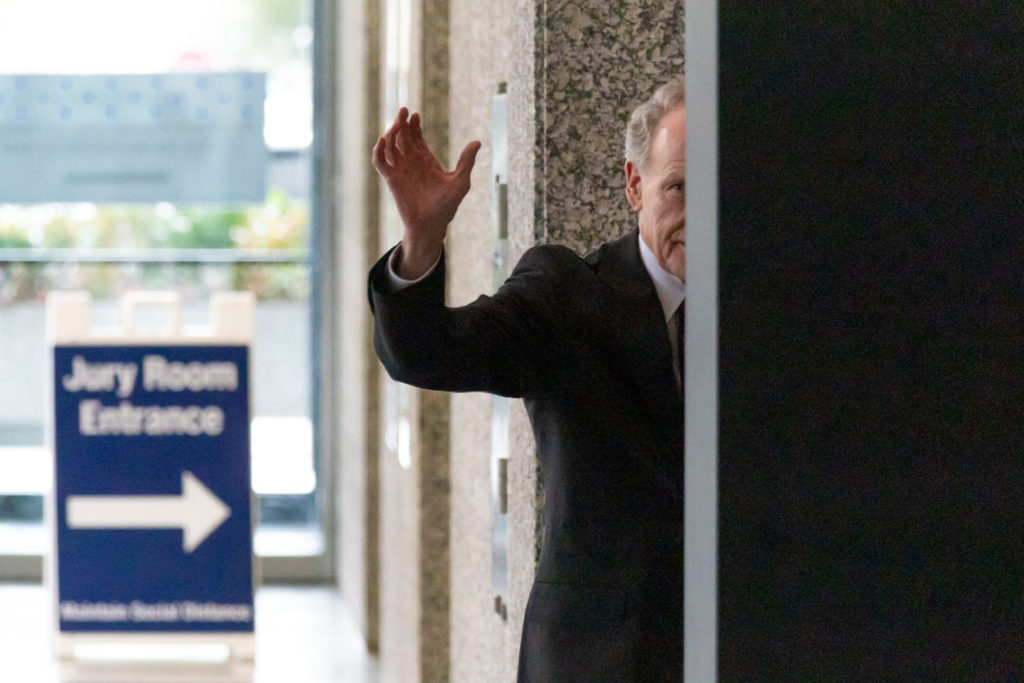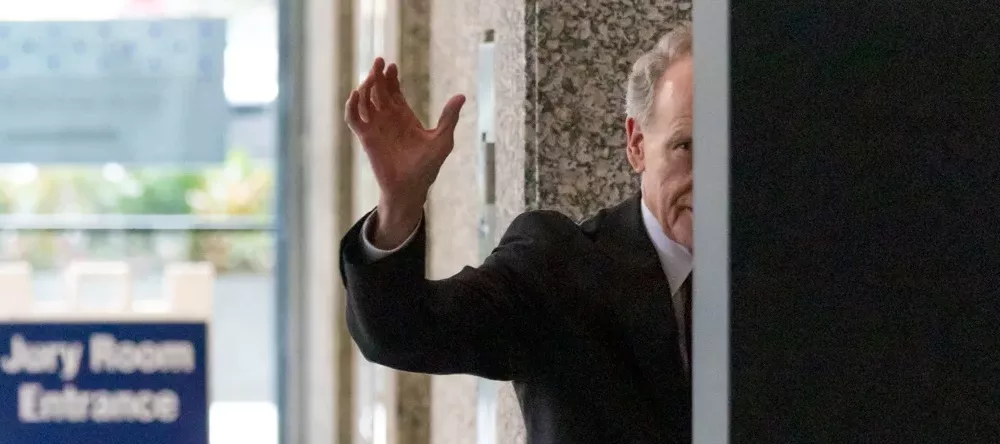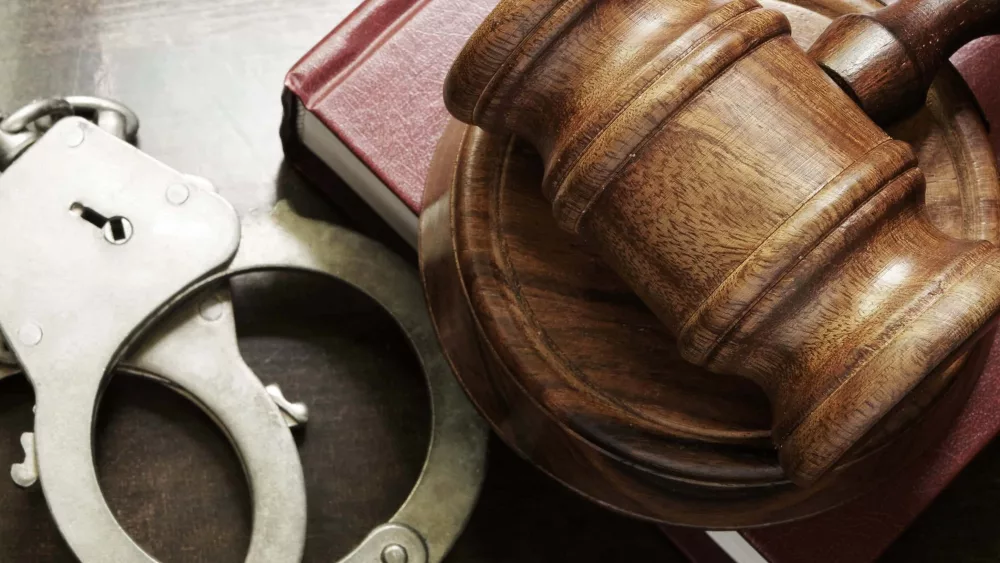
By HANNAH MEISEL
Capitol News Illinois
hmeisel@capitolnewsillinois.com
CHICAGO – Attorneys for former Illinois House Speaker Michael Madigan rested their case Thursday, marking the beginning of the end of the longtime Democratic powerbroker’s corruption trial.
After prosecutors then recalled an FBI agent to the stand for a short bit of testimony and introduced one final bank record into evidence, U.S. District Judge John Blakey told the jury that the end is near.
“Ladies and gentlemen, the government has rested its rebuttal,” he said. “That is the conclusion of facts in the case.”
Three days of closing arguments are scheduled for Wednesday, and the jury would then begin deliberating the week of Jan. 27. But before any of that can happen, the lawyers must finish debating key jury instructions on Tuesday, which happens to mark three months since opening statements kicked off the trial in October.
How closely a jury follows the lengthy and often technical instructions for a complex trial like Madigan’s is entirely up to the 12 men and women in the deliberation room. But after a U.S. Supreme Court decision this summer narrowed the federal bribery statute, attorneys on both sides have for months been preparing to argue the minutiae of bribery-related instructions.
Madigan faces 23 counts of bribery, racketeering, extortion and other corruption charges. His co-defendant, longtime Springfield lobbyist Mike McClain, is also charged in several of those counts, with prosecutors alleging he acted as Madigan’s emissary.
On the witness stand this week and last, Madigan attempted to distance himself from the portrait the feds had painted of him and McClain always acting in tandem. After that testimony, McClain’s attorneys renewed their already-rejected motion to sever their case from Madigan’s, but after brief post-court arguments Thursday, U.S. District Judge John Blakey once again denied the request.
Prosecutors allege Madigan and McClain ran a “criminal enterprise,” which enhanced the speaker’s power and enriched him and those close to him. That included political allies who got jobs and contracts with electric utility Commonwealth Edison and telecom giant AT&T Illinois from 2011 to when the FBI’s investigation was made public in 2019.
The feds characterize those jobs and contracts as bribes to Madigan and say that, in exchange, those companies had an easier time getting their preferred legislation passed in Springfield.
Government lawyers also accuse Madigan of engaging in bribery over a 1 ½ year period in 2017 and 2018 when Chicago Ald. Danny Solis, then the chair of the city council’s powerful zoning committee, introduced Madigan to several real estate developers so the speaker’s law firm could pitch them on property tax appeals services.
Prosecutors say Madigan’s promise to recommend Solis for a lucrative appointment to a state board was made in exchange for Solis steering business to Madigan, though the former speaker never made the recommendation.
Jury Instructions
In a June opinion deciding a case spawned from Portage, Indiana, the Supreme Court’s conservative majority ruled the federal bribery statute – referred to as “Section 666” – does not criminalize “gratuities” given to a state or local public official after he or she has already performed an official act.
The justices clarified that a bribe requires a quid pro quo agreement before an elected official does an “official act,” like a vote or any other action done in an official capacity. In Madigan’s case, the feds allege the former speaker’s “official act” was allowing certain bills backed by ComEd and AT&T to come to a vote in the Illinois House after staff attorneys in the speaker’s office negotiated the bills. Madigan voted for some of the bills at issue, but not all.
Madigan’s defense lawyers – and many witnesses called by both the government and defense – maintain there was nothing unusual about the speaker’s office heavily negotiating bills and pointed out that the same thing happened with staff attorneys in the Illinois Senate and the governor’s office.
Furthermore, they testified that the speaker’s office-led negotiations stripped many of ComEd’s and AT&T’s desires out of the final version of the bills that ultimately became law, and inserted provisions the companies didn’t want.
But prosecutors argue the utilities ultimately agreed to the watered-down legislation and that the various laws were still worth hundreds of millions of dollars for the companies over time.
Another significant part of last year’s SCOTUS opinion drew a distinction between “bribes” and “gratuities” by clarifying that a bribe requires a specific quid pro quo agreement beforehand. Defense attorneys are not arguing that what the feds characterize as “bribes” should really be seen as “gratuities.” But they are trying to prove Madigan did not agree to the alleged “bribes,” which means they can’t possibly constitute a quid pro quo.
Prosecutors, however, argued they’d have no trouble proving an implicit quid pro quo existed under a legal theory known as “stream of benefits,” wherein a pattern of corrupt exchanges over a long period of time is proof enough of a quid pro quo, even if there’s no smoking gun evidence of a handshake deal.
The Supreme Court majority also pointed to the federal bribery statute’s use of the word “corruptly” in criminalizing “state or local officials to ‘corruptly’ solicit, accept, or agree to accept ‘anything of value’ ‘intending to be influenced or rewarded in connection with’ any official business or transaction worth $5,000 or more,” Supreme Court Justice Brett Kavanaugh wrote in the opinion.
But the Supreme Court did not wade into defining the word “corruptly.” In a dissenting opinion, Justice Ketanji Brown Jackson warned that the majority’s opinion would make it difficult for prosecutors to go after corruption at the state and local levels given a 2005 SCOTUS decision that related the word “corruptly” with “consciousness of wrongdoing.”
“The majority worries that it may be unclear to an official whether accepting a gift is, in fact, ‘wrongful,’” she wrote. “But if ‘corruptly’ is read to require knowledge of wrongfulness, any lack of clarity benefits the official. In such circumstances, a prosecutor is almost certain to be unable to meet her burden of proof.”
Defense lawyers are leaning on that “consciousness of wrongdoing” standard, with Madigan attorney Dan Collins peppering his questions of his client on the witness stand with opportunities to deny knowledge of any wrongdoing – which he took.
Madigan, for example, repeatedly denied knowing that several of his political allies had not been doing any work in exchange for monthly checks from ComEd and AT&T over various periods dating back to 2011. He acknowledged having asked McClain to help find work for the five men, but said he never asked for him to arrange no-work contracts, and in fact was “very angry” to find out they weren’t working when the feds’ investigation was made public.
Prosecutors tried to refute those claims while Madigan was on the witness stand, playing a wiretapped phone conversation in which he and McClain laughed about different ComEd contractors having “made out like bandits” for what McClain described as “very little work.” The feds later agreed to a stipulation that ComEd’s hiring of one contractor named in the call was not initiated by Madigan.
On the witness stand, Madigan also denied having a conversation with one of those ComEd contractors. Political worker Ed Moody testified earlier in trial that he’d asked the then-speaker in 2018 if he should be worried that the utility lobbyist whose contract he was under wasn’t giving him any work, but Madigan said not to worry.
Before court recessed for the holiday weekend, Madigan attorney Tom Breen asked Blakey, a Notre Dame alum just like his client, if he was going to Monday’s college football championship game where the Fighting Irish will face the Ohio State Buckeyes.
When Blakey joked that he “doesn’t donate enough money for tickets,” Breen cheekily asked, “would you like some 50-yard line tickets, judge?”
“I’m not sure if that’s a bribe or a gratuity that’s being offered but I’m neither soliciting it or accepting it!” he replied to laughter in the courtroom.
Capitol News Illinois is a nonprofit, nonpartisan news service that distributes state government coverage to hundreds of news outlets statewide. It is funded primarily by the Illinois Press Foundation and the Robert R. McCormick Foundation.




